Jodhpur
| Jodhpur | |
|---|---|
| Metropolis | |
|
Mehrangarh Fort, Jodhpur | |
| Nickname(s): Sun City, Blue City | |
 Jodhpur  Jodhpur | |
| Coordinates: 26°17′N 73°01′E / 26.28°N 73.02°ECoordinates: 26°17′N 73°01′E / 26.28°N 73.02°E | |
| Country |
|
| State | Rajasthan |
| District | Jodhpur[1] |
| Settled | 1459 |
| Founded by | Rao Jodha of Mandore |
| Named for | Rao Jodha |
| Government | |
| • Type | Mayor-council |
| • Body | JMC |
| • Mayor, Municipal Corporation | Ghanshyam Ojha |
| • Collector & DM | Sh. Ravi Kumar Surpur, IAS |
| • Police Commissioner of Jodhpur | Ashok Kumar Rathore, IPS |
| Area[2] | |
| • Metropolis | 78.6 km2 (30.3 sq mi) |
| • Metro | 624.5 km2 (241.1 sq mi) |
| Elevation | 231 m (758 ft) |
| Population (2011 Census)[3] | |
| • Metropolis | 10,56,191 |
| • Rank | 44th |
| • Density | 13,000/km2 (35,000/sq mi) |
| • Metro[4] | 1,138,300 |
| Languages | |
| • Official | Hindi |
| • Regional | Marwari, Rajasthani |
| Time zone | IST (UTC+5:30) |
| PIN | 342001 |
| Vehicle registration | RJ 19 |
| Website |
jodhpur |
Jodhpur (/ˈdʒɒdpʊər/; pronounced [ˈd͡ʒoːd̪ʱpʊr] ![]() Listen ) is the second largest city in the Indian state of Rajasthan and officially the second metropolitan city of the state. It was formerly the seat of a princely state of the same name. The capital of the kingdom was known as Marwar. Jodhpur is a popular tourist destination, featuring many palaces, forts and temples, set in the stark landscape of the Thar Desert.
Listen ) is the second largest city in the Indian state of Rajasthan and officially the second metropolitan city of the state. It was formerly the seat of a princely state of the same name. The capital of the kingdom was known as Marwar. Jodhpur is a popular tourist destination, featuring many palaces, forts and temples, set in the stark landscape of the Thar Desert.
The city is known as the "Sun City" for the bright and sunny weather it enjoys all the year round. The old city circles the fort and is bounded by a wall with several gates.[5] Jodhpur is also known as the "Blue City" because of the blue colours that decorate many of the houses in the old city area.[6] However, the city has expanded greatly outside the wall over the past several decades.
Jodhpur lies near the geographic centre of the Rajasthan state, which makes it a convenient base for travel in a region much frequented by tourists.
History

According to the Rajasthan District Gazetteer's of Jodhpur and the Hindu epic Ramayana (composed up to the 4th century AD), Abhiras (Ahirs) were the original inhabitants of Jodhpur and later Aryans spread to this region. There may have been small settlements before Rathore rule.[7][8]
The Jodhpur city was founded in 1459 by Rao Jodha, a Rajput chief of the Rathore clan. Jodha succeeded in conquering the surrounding territory and thus founded a state which came to be known as Marwar. As Jodha hailed from the nearby town of Mandore, that town initially served as the capital of this state; however, Jodhpur soon took over that role, even during the lifetime of Jodha. The city was located on the strategic road linking Delhi to Gujarat. This enabled it to profit from a flourishing trade in opium, copper, silk, sandals, date palm and coffee.
After the death of Chandrasen Rathore the state became a fief under the Mughal Empire, owing fealty to them while enjoying some internal autonomy. During this period, the state furnished the Mughals with several notable generals such as Maharaja Jaswant Singh. Jodhpur and its people benefited from this exposure to the wider world as new styles of art and architecture made their appearance and opportunities opened up for local tradesmen to make their mark across northern India.
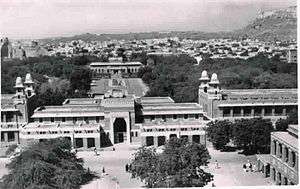
Aurangzeb briefly sequestrated the state (c.1679) on the pretext of a minority, but the prior ruler Maharaja Ajit Singh was restored to the throne by Veer Durgadas Rathore after Aurangzeb died in 1707 and a great struggle of 30 years. The Mughal empire declined gradually after 1707, but the Jodhpur court was beset by intrigue; rather than benefiting from circumstances, Marwar descended into strife and invited the intervention of the Marathas, who soon supplanted the Mughals as overlords of the region. This did not make for stability or peace, however- 50 years of wars and treaties dissipated the wealth of the state, which sought and gratefully entered into a subsidiary alliance with the British in 1818.

During the British Raj, the state of Jodhpur had the largest land area of any in the Rajputana. Jodhpur prospered under the peace and stability that was a hallmark of this era. The land area of the state was 90,554 km2 (34,963 sq mi) its population in 1901 was 44,73,759. It enjoyed an estimated revenue of £3,529,000. Its merchants, the Marwaris, flourished and came to occupy a position of dominance in trade across India. In 1947, when India became independent, the state merged into the union of India and Jodhpur became the second largest city of Rajasthan.
At the time of partition, the ruler of Jodhpur, Hanwant Singh, did not want to join India, but finally due to the effective persuasion of Sardar Vallabhbhai Patel, the Home Minister at the time, the state of Jodhpur was included in Indian Republic. Later after the State Reorganisation Act, 1956 it was included within the state of Rajasthan.

Demographics
As per provisional reports of Census India,[4] the population of Jodhpur is 1,033,918 in 2011, where males constitute approximately 52.62 percent of the population and females constitute approximately 47.38 percent. The average literacy rate of Jodhpur is 80.56 percent, with a male literacy rate of approximately 88.42 percent and a female literacy rate of approximately 73.93 percent. Approximately 12.24 percent of the population are under six years of age. Jodhpur city is governed by Municipal Corporation which comes under Jodhpur Urban Agglomeration. The Jodhpur Urban/Metropolitan area include Jodhpur, Kuri Bhagtasani, Mandore Industrial Area, Nandri, Pal Village and Sangariya. Its Urban/Metropolitan population is 1,137,815 of which 599,332 are males and 538,483 are females.
| Population Growth of Jodhpur City | |||
|---|---|---|---|
| Census | Pop. | %± | |
| 1881 | 142,600 | — | |
| 1891 | 61,800 | -56.7% | |
| 1901 | 60,400 | -2.3% | |
| 1911 | 59,300 | -1.8% | |
| 1921 | 73,500 | 23.9% | |
| 1931 | 94,700 | 28.8% | |
| 1941 | 126,900 | 34.0% | |
| 1951 | 180,700 | 42.4% | |
| 1961 | 224,800 | 24.4% | |
| 1971 | 318,900 | 41.9% | |
| 1981 | 506,345 | 58.8% | |
| 1991 | 666,279 | 31.6% | |
| 2001 | 860,818 | 29.2% | |
| 2011 | 1,056,191 | 22.7% | |
| source:[9] | |||
Climate
The climate of Jodhpur is hot and semi-arid during its nearly yearlong dry season, but contains a brief rainy season from late June to September (Köppen BShw). Although the average rainfall is around 450 millimetres (18 in), it fluctuates greatly. In the famine year of 1899, Jodhpur received only 24 millimetres (0.94 in), but in the flood year of 1917 it received as much as 1,178 millimetres (46.4 in).
Temperatures are extreme from March to October, except when the monsoonal rain produces thick clouds to lower it slightly. In the months of April, May and June, high temperatures routinely exceed 40 degrees Celsius. During the monsoon season, average temperatures decrease slightly. However, the city's generally low humidity rises, which adds to the perception of the heat. The highest temperature recorded in Jodhpur was on 18 May 2016 when it rose up to 53.2 degrees Celsius.
| Climate data for Jodhpur | |||||||||||||
|---|---|---|---|---|---|---|---|---|---|---|---|---|---|
| Month | Jan | Feb | Mar | Apr | May | Jun | Jul | Aug | Sep | Oct | Nov | Dec | Year |
| Record high °C (°F) | 31.2 (88.2) |
36.0 (96.8) |
41.6 (106.9) |
45.0 (113) |
53.2 (127.8) |
47.8 (118) |
42.6 (108.7) |
40.3 (104.5) |
42.5 (108.5) |
40.6 (105.1) |
37.5 (99.5) |
32.3 (90.1) |
53.2 (127.8) |
| Average high °C (°F) | 24.5 (76.1) |
27.4 (81.3) |
33.4 (92.1) |
38.4 (101.1) |
41.4 (106.5) |
40.0 (104) |
35.2 (95.4) |
33.5 (92.3) |
34.9 (94.8) |
35.8 (96.4) |
31.2 (88.2) |
26.9 (80.4) |
33.55 (92.38) |
| Average low °C (°F) | 9.6 (49.3) |
11.7 (53.1) |
17.3 (63.1) |
22.6 (72.7) |
26.5 (79.7) |
27.8 (82) |
26.4 (79.5) |
25.4 (77.7) |
23.9 (75) |
20.1 (68.2) |
14.7 (58.5) |
11.2 (52.2) |
19.77 (67.58) |
| Record low °C (°F) | 1.8 (35.2) |
0.7 (33.3) |
4.4 (39.9) |
15.6 (60.1) |
15.4 (59.7) |
20.0 (68) |
21.0 (69.8) |
21.2 (70.2) |
18.4 (65.1) |
12.5 (54.5) |
5.8 (42.4) |
1.7 (35.1) |
0.7 (33.3) |
| Average precipitation mm (inches) | 4.0 (0.157) |
4.0 (0.157) |
1.3 (0.051) |
4.8 (0.189) |
17.4 (0.685) |
40.0 (1.575) |
120.5 (4.744) |
111.5 (4.39) |
49.9 (1.965) |
6.9 (0.272) |
1.9 (0.075) |
0.5 (0.02) |
362.7 (14.28) |
| Source: IMD (extreme high and lows up to 2010 for Jodhpur (RS/RW))[10][11] | |||||||||||||
Economy

The handicrafts industry has, in recent years, eclipsed all the other industries in the city. The items manufactured include textiles, metal utensils, bicycles, ink and sporting goods. A flourishing cottage industry exists for the manufacture of such items as glass bangles, cutlery, carpets and marble products.
After handicrafts, tourism is the second largest industry of Jodhpur.
Major agricultural exports in the district include wheat and the famous Mathania red chilies. The city serves as an important marketplace for wool and agricultural products.
Gypsum and salt are commonly mined exports. The Indian Air Force, Indian Army, Indo Tibetan Border Police and Border Security Force maintain training centres in Jodhpur.
The administration of Jodhpur consists of a District Collector, followed by 4 additional District Magistrates (I, II, Land Conversion and City ADM). Presently, the Collector and District Magistrate is Dr. Preetam B. Yashwant (IAS). The city is also under Police Commissioner system, with Mr. Ashok Rathore (IPS) as acting Police Commissioner of the city.
The upcoming 9 MMTPA Refinery and Petrochemical complex to be set up by Hindustan Petroleum Corporation Limited (HPCL) in Pachpadra, Barmer will transform the industrial scene of the city drastically. Pachpadra lies just 60 kilometres from the industrial area of Boranada in Jodhpur. Around 120 by-products that are produced by the refinery are going to provide opportunities for new industries to be set up in and around Jodhpur.
India's most ambitious industrial development project, the over USD 100 billion dollars Delhi-Mumbai Industrial Corridor Project is also going to impact industries in Jodhpur. Marwar Junction, which is located about 103 kilometres from Jodhpur will be one of the nine freight loading points along the DMIC route. Jodhpur and Pali districts fall under the region that is going to be developed as a manufacturing hub for the DMIC.
Elected representatives
The present Member of Parliament from Jodhpur is Gajendra Singh Shekhawat of the BJP.

The current MLAs from the 3 constituencies of Jodhpur are from Jodhpur City: Shri Kailash Bhansali, Chartered Accountant; from Sardarpura: Shri Ashok Gehlot, Ex-Chief Minister of Rajasthan; from Soorsagar: Smt. Suryakanta Vyas. Other MLAs from different constituencies are Luni- Sh. Joga Ram Patel, Shergarh- Sh. Babu Singh Rathore, Bilara- Kamsa Meghwal Bopalgarh- Arjun Lal Garg, Lohawat-Gajendra singh Khivsar, Phalodi-Pabbaram Bishnoi, Osian- Bhairaram Choudhary
Strategic location
Jodhpur is a significant city of western Rajasthan and lies about 250 kilometers from the border with Pakistan. This location makes it a key base for the Indian army, Indian Air Force and Border Security Force (BSF). Jodhpur's air base is Asia's largest and one of the most critical and strategically located airbases of the IAF (The Jodhpur Airport played the crucial role during the Indo-Pakistani wars of 1965 and 1971) deployed fighter jets and Advanced Light Helicopters.
Culture
The city is famous for its food and its popularity can be judged from the fact that one can find sweet shops named 'Jodhpur Sweets' in many cities throughout India. Being at the onshore of Thar desert, life has been influenced by ways of select nomadic tribes (So-called "Gypsy" groups - Banjare in Hindi - have settled in some parts of the city).
Tourism
Jodhpur's most notable attractions are Mehrangarh Fort, Umaid Bhawan Palace, Jaswant Thada, and the Ghanta Ghar, or Clock Tower. Tourists are also within proximity to Fort Auwa, Mandore, Kaylana Lake and Garden, Balsamand Lake, Mandaleshwar Mahadev Temple (Mandalnath), Ratanada Ganesh Temple, Sardar Samand Lake and Palace, Masooria Hills, Veer Durgadas Smarak (monument, park and museum), Bhim Bhirak Cave, and Ravan Ka Mandir, the only Ravan temple in India.
Film & Ad Shooting
The historic buildings and landscapes of the city were featured in a number of movies, including The Dark Knight Rises directed by Christopher Nolan, Baadshaho starring Ajay Devgn and Emraan Hashmi, The Darjeeling Limited starring Owen Wilson, Adrien Brody, and Jason Schwartzman, The Fall directed by Tarsem Singh), "Hum Saath-Saath Hain" directed by Sooraj Barjatya, "Veer" directed by Anil Sharma, "Shuddh Desi Romance" directed by Maneesh Sharma and "I" directed by S. Shankar, "Kung Fu Yoga" starring Jackie chan, Sonu Sood, Disha Patani, "Loafer" starring Varun Tej and Disha Patani; Supreme (film) starring Sai Dharam Tej and Rashi Khanna; Airlift feat.in Akshay Kumar and Nimrat Kaur.
Places of recreation
Some of the recreation places worth mentioning are:
- Mandore Gardens
- Kaylana Lake
- Shastri Circle
- Masuria Hill Garden
- Rao Jodha Desert Rock Park
- Science Park
- Ummed Garden
- Chokelav Baag
- Machiya Safari Park
Fairs and festivals
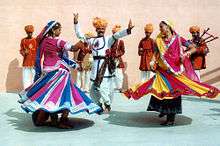
- Marwar Mahotsav
- Gangaur
- Baithmaar Gangaur Mela
- Teej
- Nag Panchami Fair
- Sheetla Mata Fair
- Baba Ramdev Pir Mela
- Rajasthan International Folk Festival (RIFF)
- World Sacred Spirit Festival
Temples
- Chamunda Mata Temple (near Mehrangarh Fort)
- Raj Ranchhodji Temple
- Achal Nath Shivalaya
- Siddhanth Shiv Temple
- Rasik Bihari Temple
- Ganesh Temple
- Baba Ramdeo Temple, Masuria hill
- Shiv Temple, Shiv Sagar, Mata ka than
- Udai Mandir in city area
- Kunj Bihari Temple
- Dauji Temple, Hathi Ram ka Oda
- Ravan Temple
Cuisine

A number of dishes from Indian cuisine originated in Jodhpur, such as Makhaniya Lassi, Mawa Ki Kachori, Pyaaj Ki Kachori, Hot & Spicy Mirchi Bada, Dal Bati Churma, Lasan Ki Chutney, Mirchi Ka Kutaa, Gatte Ki Sabzi, Ker Sangri Sabzi, Raab, Lapsi, Aate Ka Halwa, Kachara Mircha Sabzi and Kadhi Pakoda with Baajre Ka Sogra. Jodhpur is known for its sweets ranging from traditional "Makhanbada", "Mawa Ki Kachori", "Malpua", "Ghevar", "Motichur Ke Laddu", "Besan barfi", "Thorr" and "Gulab Jamun" to Bengali "Rasgulla" and "Ras Malai" prepared by a traditional house "janta sweets".
Sports
Jodhpur has two outdoor stadiums and one indoor stadium complex. Barkatullah Khan Stadium has hosted two cricket ODIs. Umaid stadium footboll stadium and Gaushala maidan sports stadium. and railway cricket ground.
| S No | Team (A) | Team (B) | Winner | Margin | Year |
|---|---|---|---|---|---|
| 1 | | | | By 1 wicket | 2000 |
| 2 | | | | By 3 wickets | 2002 |
Education and research
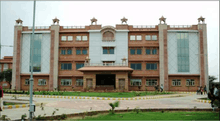

Jodhpur is fast becoming a major education hub for higher studies in India. With many renowned academicians, Jodhpur is India's largest hub for preparation of the Chartered Accountant (CA) entrance examination held throughout India by the Institute of Chartered Accountants of India (ICAI).
The most notable include:
- Indian Institute of Technology Jodhpur (IITJ) is a technical education institute in India, one of the new IITs. (It started in 2008.)
- All India Institute of Medical Sciences Jodhpur (AIIMS Jodhpur)
- National Law University Jodhpur (NLU Jodhpur) is one of the 17 universities imparting law education (established in 1999).
- National Institute of Fashion Technology Jodhpur (NIFT Jodhpur): a fashion design institute (started in 2010).
- Dr. Sarvepalli Radhakrishnan Rajasthan Ayurved University (DSRRAU Jodhpur) is a university in the field of Ayurveda. A second university of its kind in India was started in 2003.
- Jai Narain Vyas University (JNVU, Jodhpur), formerly known as University of Jodhpur, is run by the State Government of Rajasthan (established in 1962).
- Dr. S.N. Medical College, Jodhpur (established in 1965)
- MBM Engineering College: the oldest engineering institution in Rajasthan, now a faculty of Engineering and Architecture, under JNVU, (established in 1951)
- Footwear Design and Development Institute Jodhpur (FDDI Jodhpur) is an institute established by the Government of India, Ministry of Commerce & Industry for the design and development of footwear, fashion and leather (started in 2012).
- Indian Institute of Handloom Technology (IIHT Jodhpur) is one of the five institutes nationwide to provide research, development and technical education to the handloom industry.
- Sardar Patel University of Police, Security and Criminal Justice, started in 2013, is a university for research and education in the field of security, policing and criminal justice.
- Government Polytechnic College
- Government College of Physical Education
- Government College, Chenpura
- Lachoo Memorial College of Science & Technology (LMCST)
- Onkarmal Somani College of Commerce
- Mahila P.G Mahavidyalaya
- Prof. A.D Bohra Memorial Law College
- Jodhpur National University
- JIET (Jodhpur) (Jodhpur Institute of Engineering & Technology)
- Marwar Engineering College & Research Centre
- S.L.B.S Engineering College
- Mayurakshi Institute of Engineering & Technology
- Raj Engineering College
- Vyas Institute of Higher Education
- Aishwarya college of education
Research
Major research institutes and organizations have been established in the city for promoting research:
- Arid Forest Research Institute is one of the institutes of the Indian Council of Forestry Research and Education (ICFRE) working under the Ministry of Environment & Forests, Govt. of India for carrying out scientific research in forestry to provide technologies to increase the vegetative cover and to conserve the biodiversity in the hot arid and semi-arid region of Rajasthan, Gujarat and Dadara union, and Nagar Haveli union territory. The campus covers 66 hectares on the New Pali Road.
- Central Arid Zone Research Institute (CAZRI) is a premier Organisation of the Indian Council of Agricultural Research (ICAR), an autonomous organization under the Department of Agricultural Research and Education, Ministry of Agriculture, Government of India.
- Desert Medicine Research Centre (DMRC) is one of the 33 permanent institutes of Indian Council of Medical Research which is an autonomous body for the formulation, coordination and promotion of biomedical research in the country.
- Desert Regional Centre, Zoological Survey of India (DRC-ZSI) is the regional arm of the only taxonomic organization in the country involved in the study of all kinds of animals to promote survey, exploration, and research leading to the advancement of zoological study.
- Botanical Survey of India (BSI) is the nodal research organization under Ministry of Environment and Forests for research, exploration, and survey of the flora of India.
- Defence Research and Development Organisation (DRDO) is an organization working under the Department of Defence Research and Development of Ministry of Defence for design and development leading to the production of world-class weapon systems and equipment.
- Regional Remote Sensing Centre (RRSC, ISRO) is one of the five centers established under National Natural Resources Management System (NNRMS) by Department of Space for remote sensing tasks at regional and national levels.
- MBM Engineering College: Research in Master and Ph.D. programs in branches of engineering is done by highly experienced faculty. In civil and chemical engineering, national and state projects are performed by this college.
Judiciary
Rajasthan High Court is the High Court of the state of Rajasthan. It was established on 21 June 1949 under the Rajasthan High Court Ordinance, 1949.
The High Court of Rajasthan was founded in 1949 in Jodhpur and was inaugurated by the Rajpramukh, Maharaja Sawai Man Singh on August 29, 1949. The first Chief Justice was Kamala Kant Verma and the current Chief Justice of the Rajasthan High Court is the Honorable Justice Satish Kumar Mittal. A bench was formed at Jaipur which was dissolved in 1958 and was again formed on January 31, 1977. Currently, there are forty sanctioned judges.
Civic administration
| Jodhpur City officials | |
|---|---|
| Mayor | Mr. Ghanshyam Ojha |
| Collector | Sh. Vishnu Charan Mallik,[12] IAS |
| Police Commissioner | Mr. Ashok Rathore |
| Chief Justice of the Rajasthan High Court | Hon'ble Mr. Justice Satish Mittal |
| Chairman, Jodhpur Development Authority | |
The city is administered by the Jodhpur Nagar Nigam headed by a mayor. For administrative purposes, the city is divided into 65 wards, from which the members of the corporation council are elected for five years. The municipal corporation has 65 elected members known as councilors, or parshad in Hindi, representing their respective wards (65 geographical units of the city). The ward members are elected by direct voting by electorate for a period of 5 years. In addition to these 65 directly elected members, the corporation has 4 Ex-officio members (1 member of parliament, 3 members of legislative assembly, namely Sardarpura, Soorsagar, City) and 3 Nominated Members.
Transportation
The city has well-established rail, road and air networks connecting it to other major cities of the country.
Railways
Jodhpur railway station is the divisional headquarters of the North Western Railways (NWR). It is well connected with railways to major Indian cities like Alwar, Delhi, Mumbai, Kolkata, Chennai, Bangalore, Trivandrum, Pune, Kota, Kanpur, Bareilly, Hyderabad, Ahmedabad, Indore, Bhopal, Dhanbad, Patna, Guwahati, Nagpur, Lucknow, Gwalior, Jaipur etc. To decongest the main Jodhpur station (JU), the suburban station Bhagat ki Kothi (BGKT) is being developed as the second main station for passenger trains. At present 106 trains serves to both the stations. Some of the important trains originating from Jodhpur railway station are- Ranthambore Express (Jodhpur to Indore), Mandore Express (Jodhpur to Delhi), Suryanagri Express (Jodhpur to Mumbai), Marudhar Express (Jodhpur to Lucknow), Howrah Superfast (From Jodhpur to Howrah) etc.
For further train running information, timings, halts etc. visit the official website of Indian Railways
Luxury train service- For experiencing the true magnificence and royal opulence of Rajasthan, luxury trains Palace on Wheels and Royal Rajasthan on Wheels are run jointly by RTDC and Indian railways. Jodhpur is one of the destinations of both of the trains. Recently a plan to start metro train service in Jodhpur was proposed to decongest the city traffic. However, this proposal is still pending with the state government for its approval.
Suburban stations around Jodhpur
| No. | Suburban Station Name[13] | Distance (in km) |
|---|---|---|
| 1 | Raikabagh Palace Junction | 02 |
| 2 | Bhagat Ki Kothi railway station | 03 |
| 3 | Mahamandir Railway Station | 05 |
| 4 | Basani Railway Station | 06 |
| 5 | Jodhpur Cantt Railway Station | 08 |
| 6 | Mandor Railway Station | 10 |
| 7 | Banar Railway Station | 14 |
| 8 | Salawas Railway Station | 16 |
Air
Jodhpur Airport is one of the prominent airports of Rajasthan. It is primarily a military airbase with a civil enclosure to allow for civilian air traffic. Due to Jodhpur's strategic location, this airport is regarded as one of the most important ones for the Indian Air Force.
At present, there are daily flights from Delhi, Mumbai, Udaipur, Jaipur and Bangalore to the city operated by Air India and Jet Airways and Spicejet. The bill and basic formalities for the long-awaited expansion of the airport were cleared by all the concerned authorities in June 2016, clearing the way for the expansion of the airport in two phases beginning Feb 2016. Post the expansion, it is expected that there will be morning and evening flights from the city to more cities than presently available in addition to more airlines coming to and fro the city.
Road
Jodhpur is connected by road to all major cities in Rajasthan and neighboring states like Delhi, Ahmedabad, Surat, Ujjain, Agra etc. Apart from deluxe and express bus services to cities within the state, Rajasthan Roadways provides Volvo & Mercedes Benz bus service to Delhi, Ahmedabad, Jaipur, Udaipur and Jaisalmer . Recently, Bus Rapid Transit System (BRTS) is launched in the city with low floor and semi low floor buses plying on major routes. Jodhpur is connected to the National Highway network with three National Highways and to the Rajasthan State Highway network with ten state highways. National Highways passing through Jodhpur:
- NH-62, Ambala-Kaithal-Hissar-Fatehpur-Jodhpur-Pali, total length= 690 km
- NH-112, Junction with NH-14 near Bar connecting Jaitaran-Bilara-Kaparda-Jodhpur-KalyanpurPachpadra-Baloootra-Tilwara-Kher-BagundiDhudhwa-Madhasar-Kawas and terminating at its junction with NH 15 near Barmer, total length= 343 km
- NH-114, Junction with NH-65 near Jodhpur connecting Balesar - Dechhu and terminating at its junction with NH-15 near Pokaran, total length= 180 km
State Highways passing through Jodhpur:
- SH-19, Phalodi (NH 15) to Needar via Ahu, Chadi, Pachudi, Nagaur, Tarneu, Khatu Kalan, Khatu khurd, Toshina, Kuchaman City, Bhuni, Maroth, Deoli Minda, Renwal Crossing, Kaladera, total length= 368 km
- SH-21, Dantiweara to Merta City via Pipar City, Borunda, total length= 97 km
- SH-28, Phalodi (NH 15) to Ramji ki Gol via Deeechu, Shergarh, Pachpadra, Balotra, Sindri, Guda Malani.total length= 259 km
- SH-58, Jodhpur to Bheem up to NH 8 via Vinakiya, Rajola Sojat, Rendiri, Bhaisana, Sojat Road, Kantalia, Baban. total length= 142 km
- SH-61, Phalodi ( NH 15) to Mandal via Osian, Mathania, Jodhpur, Khejrali, Bhatenda, Saradasamand, Jadan, Marwar Junction, Auwa, Jojawar, Kamalighat, Devgarh, Rajaji ka kareda.total length=349 km
- SH-62, Bilara to Pindwara via Sojat, Sireeyari, Jojawar, Bagol, Desuri, Sadri, Sewari.total length=187 km
- SH-63, Banar to Kuchera via Bhopalgarh Asop.total length=129 km
- SH-65, Sheo (NH 15) to Shergarh via Bhiyad, Barnawa Jagger, Patodi, Phalsoond.total length=155 km
- SH-66, Siwana to Dhandhaniya (NH 114) via Samdari, Kalyanpur, Mandli Rodhawa Kalan.total length=90 km
- SH-68, Dangiyawas (NH 112) to Balotra via Kakelao, Khejarli, Guda Kakani, Luni, Dhundhara, Rampura, Samdari.total length=131 km
FM stations
Jodhpur has total of five FM stations:
See also
- Auwa
- Arid Forest Research Institute (AFRI) Jodhpur
- Mandore
References
- ↑ "Jodhpur.nic.in".
- ↑ "Jodhpur District Census 2011 Handbook: VILLAGE AND TOWN WISE PRIMARY CENSUS ABSTRACT (PCA)" (PDF). Censusofindia.gov.in. p. 33. Retrieved 19 April 2016.
- ↑ ORGI. "Census of India : Provisional Population Totals Paper 1 of 2011 : Rajasthan".
- 1 2 3 "Jodhpur City Population Census 2011 - Rajasthan".
- ↑ Gopal, Madan (1990). K.S. Gautam, ed. India through the ages. Publication Division, Ministry of Information and Broadcasting, Government of India. p. 178.
- ↑ Forster, Stuart. "Why is Jodhpur Known as the Blue City?".
- ↑ Rajasthan [district Gazetteers].: Jodhpur-page-18
- ↑ Rajasthan [district Gazetteers].: Jodhpur – Rajasthan (India). Government Central Press. 1979.
- ↑ "Historical Census of India".
- ↑ "Jodhpur Climatological Table Period: 1971–2000". India Meteorological Department. Retrieved 1 July 2016.
- ↑ "Ever recorded Maximum and minimum temperatures up to 2010" (PDF). India Meteorological Department. Archived from the original (PDF) on 21 May 2013. Retrieved April 15, 2015.
- ↑ http://jodhpur.nic.in/tel-state.html
- ↑ "Suburban Railway Stations of Jodhpur".
Further reading
- Jodhpur, Published by [s.l.], 1933.
- Maharaja of Marwar 1973.
- Marwar under Jaswant Singh, (1658–1678): Jodhpur hukumat ri bahi, by Satish Chandra, Raghubir Sinh, Ghanshyam Dattan Singh of Jodhpur and His Times (1803–1843 A.D.), by padmaja Sharma. Published by Shiva Lal Agarwala, 1972.
- The Administration of Jodhpur State, 1800–1947 A.D., by Nirmala M. Upadhyaya. International Publishers, Sharma. Published by Meenakshi Prakashan, 1976.
- The History of Rajputana-Vol.IV, PartII. The History of the Jodhpur State, Part II, Veer Durgadas. 1941, Dr. Gaurishankar Hirachand Ojha.
- Jodhpur, Bikaner, Jaisalmer: Desert Kingdoms, by Kishore Singh, Karoki Lewis. Lustre Press Ltd. 1992.
- The House of Marwar: The Story of Jodhpur, by Dhananajaya Singh. Lotus Collection, Roli Books, 1994. ISBN 81-7436-002-6.
- Modern Indian Kingship: Tradition, Legitimacy & Power in Jodhpur, by Marzia Balzani. Published by James Currey Limited, 2003. ISBN 0-85255-931-3.
- Rathod Durgadas by Pt. Bishweshharnath Reu, 1948, Archaeological Department, Jodhpur.
- Veer Durgadas Rathor by Dr. L. S. Rathore, Thar Bliss Publisher, Jodhpur, 1987.
- Jodhpur and the Later Mughals, AD 1707–1752, by R. S. Sangwan. Published by Pragati Publications, 2006.
External links
| Wikimedia Commons has media related to Jodhpur. |
| Wikivoyage has a travel guide for Jodhpur. |
- Official website
- Jodhpur at Rajasthan Tourism Website
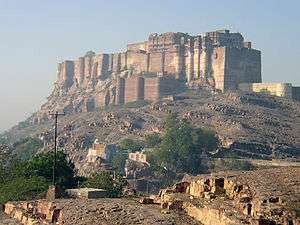 |
|
|
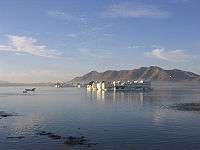 |
| Jodhpur | Rajasthan | India | Udaipur |
.jpg)





